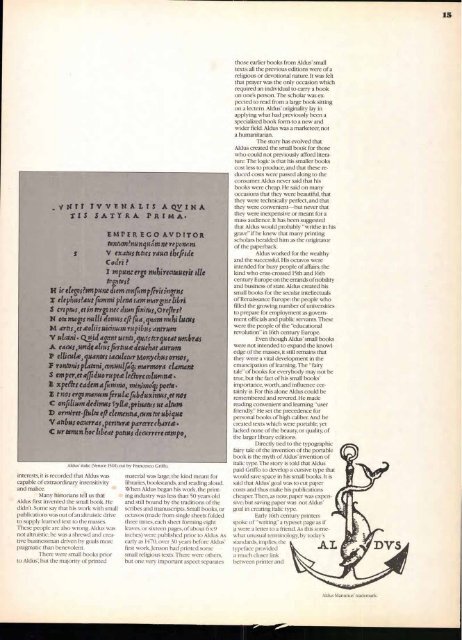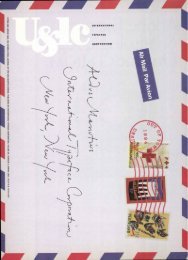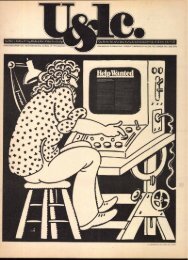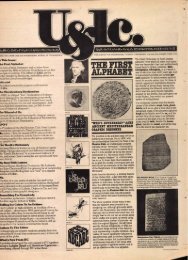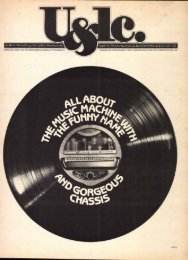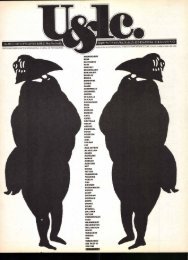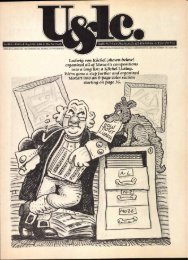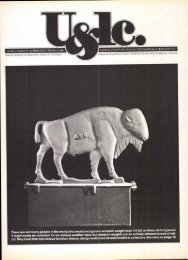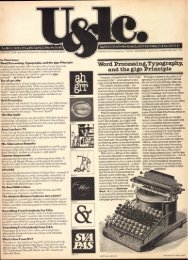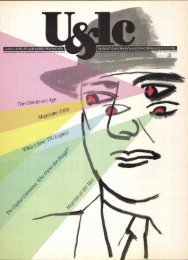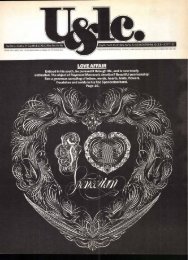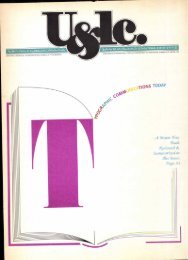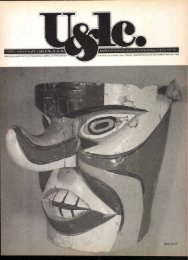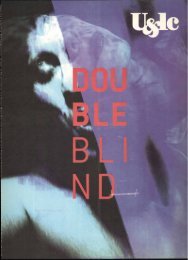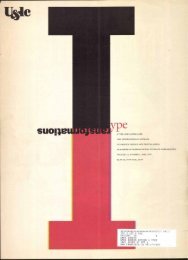Volume 12–4 (Low Res).pdf - U&lc
Volume 12–4 (Low Res).pdf - U&lc
Volume 12–4 (Low Res).pdf - U&lc
Create successful ePaper yourself
Turn your PDF publications into a flip-book with our unique Google optimized e-Paper software.
.,yN'TT TVVENALTS ACty:INA<br />
T1S SA.TYRA PRImA<br />
EMPER EGO AVDTTOR<br />
tanturn?nunqutm ne re ponem<br />
v exatus tocs rdua thefigde<br />
c °chi ?<br />
m punt ergo nuhirentautrit the<br />
trpses?<br />
It is elegas?pmpune diem confirm pflrisingens<br />
elephus?aut rummi plena ram margine Itbri<br />
S crsplus,etintrrgonecdamrt finitus,orefirs?<br />
N otamagrsWillidonutsef1 fut,cram nuhi lung<br />
M anis ,et Lou ir uicisu‘mrupibus antrum:<br />
V :da ta quid apt ucntz,gwas torqueat 107:brdS<br />
A tants , undtaltus fifrbuee dcuehat durum<br />
P cl/i cub e,quantits Sandefur Monychus ornos „<br />
rontanis platani,amustlfaig; marmora clamant<br />
S emper,et afficluo ru ?tee teflon coluInnit<br />
E xpeeIrs calms 4frim mirsima'q; poets.<br />
E t nos ergo manum firulecfiduluximus,et nos<br />
C onfilium cleclimus Sylice,piiikttus ut altum<br />
ormiret flubs: eft clemenna,cum tot ubique<br />
V a tsbus ocrurras ,pertturx parcerc chartie<br />
C ur tanun hoc ltheat potuss clecurrere atm po,<br />
Aldus' italic (Venice 1501) cut by Francesco Griffo.<br />
interests, it is recorded that Aldus was<br />
capable of extraordinary insensitivity<br />
and malice.<br />
Many historians tell us that<br />
Aldus first invented the small book. He<br />
didn't. Some say that his work with small<br />
publications was out of an altruistic drive<br />
to supply learned text to the masses.<br />
These people are also wrong. Aldus was<br />
not altruistic; he was a shrewd and creative<br />
businessman driven by goals more<br />
pragmatic than benevolent.<br />
There were small books prior<br />
to Aldus', but the majority of printed<br />
material was large; the kind meant for<br />
libraries, bookstands, and reading aloud.<br />
When Aldus began his work, the printing-industry<br />
was less than 50 years old<br />
and still bound by the traditions of the<br />
scribes and manuscripts. Small books, or<br />
octavos (made from single sheets folded<br />
three times, each sheet forming eight<br />
leaves, or sixteen pages, of about 6x9<br />
inches) were published prior to Aldus. As<br />
early as 1470, over 30 years before Aldus'<br />
first work, Jenson had printed some<br />
small religious texts. There were others,<br />
but one very important aspect separates<br />
those earlier books from Aldus' small<br />
texts: all the previous editions were of a<br />
religious or devotional nature. It was felt<br />
that prayer was the only occasion which<br />
required an individual to carry a book<br />
on one's person. The scholar was expected<br />
to read from a large book sitting<br />
on a lectern. Aldus' originality lay in<br />
applying what had previously been a<br />
specialized book form-to a new and<br />
wider field. Aldus was a marketeer, not<br />
a humanitarian.<br />
The story has evolved that<br />
Aldus created the small book for those<br />
who could not previously afford literature.<br />
The logic is that his smaller books<br />
cost less to produce, and that these reduced<br />
costs were passed along to the<br />
consumer. Aldus never said that his<br />
books were cheap. He said on many<br />
occasions that they were beautiful, that<br />
they were technically perfect, and that<br />
they were convenient—but never that<br />
they were inexpensive or meant for a<br />
mass audience. It has been suggested<br />
that Aldus would probably "writhe in his<br />
grave" if he knew that many printing<br />
scholars heralded him as the originator<br />
of the paperback.<br />
Aldus worked for the wealthy<br />
and the successful. His octavos were<br />
intended for busy people of affairs; the<br />
kind who criss-crossed 15th and 16th<br />
century Europe on the errands of nobility<br />
and business of state. Aldus created his<br />
small books for the secular intellectuals<br />
of Renaissance Europe: the people who<br />
filled the growing number of universities<br />
to prepare for employment as government<br />
officials and public servants. These<br />
were the people of the "educational<br />
revolution" in 16th century Europe.<br />
Even though Aldus' small books<br />
were not intended to expand the knowledge<br />
of the masses, it still remains that<br />
they were a vital development in the<br />
emancipation of learning. The "fairy<br />
tale" of books for everybody may not be<br />
true, but the fact of his small books'<br />
importance, worth, and influence certainly<br />
is. For this alone Aldus could be<br />
remembered and revered. He made<br />
reading convenient and learning "user<br />
friendly." He set the precedence for<br />
personal books of high caliber. And he<br />
created texts which were portable, yet<br />
lacked none of the beauty, or quality, of<br />
the larger library editions.<br />
Directly tied to the typographic<br />
fairy tale of the invention of the portable<br />
book is the myth of Aldus' invention'of<br />
italic type. The story is told that Aldus<br />
paid Griffo to develop a cursive type that<br />
would save space in his small books. It is<br />
said that Aldus' goal was to cut paper<br />
costs and thus make his publications<br />
cheaper. Then, as now, paper was expensive;<br />
but saving paper was not Aldus'<br />
goal in creating italic type.<br />
Early 16th century printers<br />
spoke of "writing" a typeset page as if<br />
it were a letter to a friend. As this somewhat<br />
unusual terminology, by today's<br />
standards, implies, the<br />
typeface provided<br />
a much closer link<br />
between printer and<br />
15


